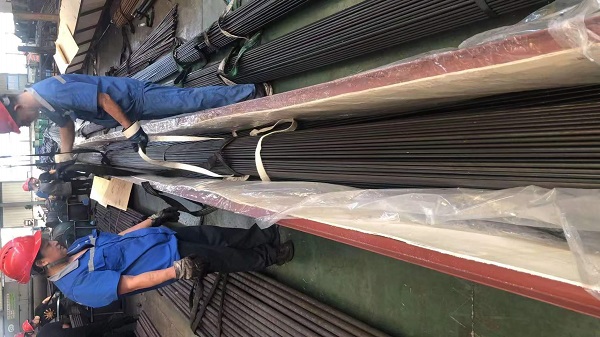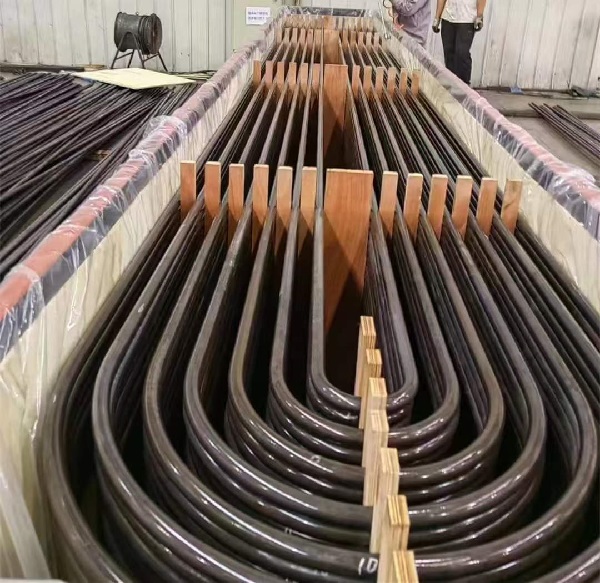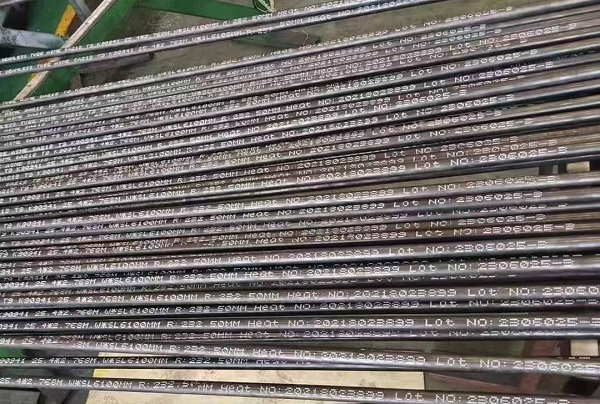Categories
- Technical & Application (25)
- Steel Tubing (20)
- Alloy Tubing (8)
The ASTM A213 T9 seamless tubing is a typical heat-resistant ferritic steel boiler, superheater, and heat-exchanger tube, which has the nominal composition 9Cr-1Mo and UNS number K90941. It is also known as 9Cr-1Mo tubing. These tubes are widely used in oil refineries, chemical industries, and fossil or nuclear power plants. The main advantage of 9Cr-1Mo steel is the improved stress rupture & creep strength from molybdenum and chromium additions at elevated temperatures, and the enhanced oxidation & corrosion resistance from chromium. Generally, ASTM A213 T9 seamless tubes can be used with the maximum temperature limit of 650°C [1200°F].

ASTM A213 T9 seamless tubes packed into wooden cases, supplied to Poland.
The chemical composition of ASTM A213 T9 tubing is specified as follows:
The mechanical properties of ASTM A213 T9 tubing are as follows:

ASTM A213 T9 seamless U-bent tubes, for heat exchangers in a power plant, Peru.
Both grades T9 (9Cr-1Mo, UNS K90941) and T22 (2.25Cr-1Mo, UNS K21590) of ASTM A213 are chromium-molybdenum alloy steels for heat-resistant service. Grade T9 tubes are generally lower in stress rupture and creep strength than the lower-chromium grade T22 tubes. That is because the strength at elevated temperatures typically drops off with an increase in chromium. However, this may not always be the case, depending on the service temperature and the exposure. Heat treatment is also an important factor. The main advantage of 9Cr-1Mo (grade T9) is the improved oxidation resistance from the increased chromium content. According to ASME BPVC Section II Part D, the allowable stresses for ASTM A213 T9 is relatively lower than that of ASTM A213 T22. The same trend is also endorsed by ASME B31.1 Power Piping Code. However, in ASME B31.1, the maximum-use temperature of T22 tubing is 1100°F compared to that of T9 tubing is 1200°F.
ASTM A213 T9 seamless tubes shall be made by the seamless process: Alloy steel billets are first heated in a rotary hearth furnace above 1200°C (2192°F) to make them pliable, after which they undergo rotary piercing to form a hollow shell, creating the tube’s seamless structure. This shell is then elongated through a series of rolling mills, which reduce wall thickness and increase tube length, followed by sizing and stretch-reducing to achieve precise dimensions. If further dimensional accuracy or surface finish improvement is required, cold working processes like cold drawing or cold rolling are employed, which also enhance mechanical properties by work hardening the material. Intermediate annealing may be performed between cold working steps to relieve internal stresses and restore ductility.

Marking of 9Cr-1Mo (ASTM A213 T9) tubes: (OD)25.4mm x (min. WT)2.768mm x (L)6100mm.
Usually, the normalization and quenching treatment shall be performed as the final heat treatment for ASTM A213 T9 seamless tubes. The tubes are heated to a temperature of around 1040°C to 1080°C (1904°F to 1976°F) and then cooled in air. This process refines the grain structure and improves mechanical properties. After normalizing, the tubes are tempered by heating them to a temperature between 730°C to 780°C (1346°F to 1436°F) and then cooled rapidly. This step enhances toughness and reduces brittleness while ensuring that the tubes retain sufficient hardness and strength for high-temperature service. Upon purchaser’s requirement, grade T9 tubes can also be fully annealed or isothermally annealed in which the tubes are heated to a high temperature (typically 675°C or higher) for a specific duration, followed by slow cooling. This annealing process relieves internal stresses and homogenizes the microstructure.
Heat analysis, tensile test, hardness test, visual inspection, dimensional examination, flattening test, flaring test, hydrostatic test, and NDT.